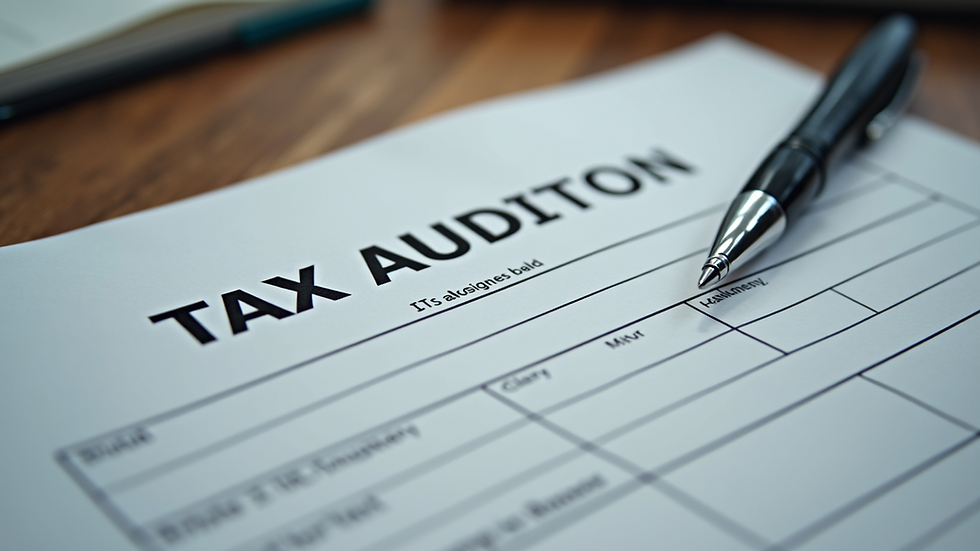Understanding Tax Audits Their Importance and Insights on Forms 3CA-3CB & 3CB-3CD
- knp gst
- Aug 6, 2025
- 4 min read
Tax audits are essential for keeping the tax system fair, ensuring compliance, and promoting transparency in financial operations. With the increasing complexity of tax regulations, both individuals and businesses need to grasp what a tax audit is and why it matters. In particular, forms like 3CA-3CB and 3CB-3CD play a crucial role during the audit process, acting as vital instruments for reporting and compliance.
What Is a Tax Audit?
A tax audit is a detailed examination of an individual or organization's financial records and tax returns by tax authorities. The main goal is to verify the accuracy of reported income, expenses, and other tax-related information. This process ensures taxpayers meet their obligations while following tax laws.
The scope of a tax audit can differ widely. Some may focus on specific entries, while others may assess a taxpayer's overall financial performance. Audits can arise randomly, due to discrepancies, or in response to specific concerns in tax filings.
Types of Tax Audits
Tax audits can be divided into several categories:
Correspondence Audit: Conducted via mail, this audit addresses specific issues or discrepancies noticed in the tax return.
Office Audit: This audit occurs in the tax office where taxpayers provide documents for review.
Field Audit: A comprehensive examination performed at the taxpayer's location, reviewing all aspects of their financial activities.
Each audit type has unique procedures and expectations, influencing how taxpayers should prepare.

Importance of Tax Audits
Understanding the significance of tax audits is crucial for all taxpayers. Here are some reasons why they hold importance:
Ensuring Compliance: Tax audits confirm adherence to tax laws, reducing the risk of penalties for mistakes. For example, compliance can save businesses from fines that can reach 20% to 30% of the owed taxes.
Detecting Fraud: Auditors can uncover fraudulent activities or tax evasion attempts. For instance, authorities identified tax evasion worth over INR 1,000 crore in 2022, highlighting the importance of audits in maintaining integrity.
Transparency: Regular audits build public confidence in the tax system, promoting transparency in financial reporting.
Error Identification: Audits often reveal unintentional errors in tax filings, allowing taxpayers to correct mistakes and prevent complications.
Better Financial Management: Being involved in the audit process encourages taxpayers to keep organized records, leading to smarter financial management.
The Role of Forms 3CA-3CB and 3CB-3CD
In India, Forms 3CA-3CB and 3CB-3CD are fundamental to the tax audit process, especially for entities needing an audit under the Income Tax Act.
3CA-3CB
Form 3CA is for taxpayers required to have their accounts audited under laws other than the Income Tax Act. This form acts as a declaration indicating their accounts are audited.
Form 3CB is submitted alongside 3CA. It details the auditor's findings and is especially relevant for partnerships, confirming compliance with auditing standards. For example, a partnership firm may show compliance by citing auditor comments on financial statements, enhancing credibility.
The combination of 3CA and 3CB simplifies compliance and reporting, ensuring clarity in financial disclosures.

3CB-3CD
Form 3CB precedes Form 3CD, helping auditors document critical details regarding tax audits for relevant entities.
Form 3CD gathers detailed financial data, including income, expenses, and tax calculations. This form is essential in the audit report, offering a clear picture of the entity's financial activities for the fiscal year. For instance, a company could report a turnover of INR 5 crores in Form 3CD, showcasing compliance with regulatory requirements.
When combined, Forms 3CB and 3CD ensure auditors share all necessary information while maintaining compliance with Income Tax regulations.
Who Needs a Tax Audit?
It is essential for taxpayers to know who must undergo a tax audit. Some specific categories include:
Businesses with Turnover: Any business with a turnover over INR 1 crore is usually subject to a tax audit.
Professionals: Individuals earning more than INR 50 lakh must also adhere to tax audit requirements.
Other Circumstances: Other unique situations, such as previous tax discrepancies, may also lead to audit requirements.
The Process of a Tax Audit
The tax audit process involves several key stages:
Notification: Tax authorities inform the taxpayer about the audit initiation, including its scope and nature.
Documentation Collection: The taxpayer must gather and submit necessary documents, such as financial statements, invoices, and receipts.
Review and Analysis: Auditors closely examine the submitted materials, assess adherence to regulations, and analyze financial data.
Findings Report: After analysis, auditors prepare a report summarizing findings and potential discrepancies, along with recommendations.
Final Review: The taxpayer and auditors discuss the findings, leading to final decisions on actions or penalties.
Tips for a Successful Tax Audit
To prepare for a tax audit, taxpayers should consider the following best practices:
Maintain Accurate Records: Keeping precise and organized financial records is critical for a smooth audit experience.
Stay Informed: Familiarizing oneself with current tax laws can help avoid mistakes and ensure compliance.
Be Responsive: Quick responses to auditor queries can significantly simplify the audit process.
Consult a Professional: Engaging an experienced tax advisor can provide useful guidance throughout the audit.
Review Past Audits: Reflecting on findings from previous audits can help identify future compliance concerns.
Common Challenges During a Tax Audit
Despite the importance of tax audits, taxpayers may experience challenges, such as:
Complex Regulations: The intricacies of tax rules can lead to confusion and mistakes.
Time-Consuming Process: Audits often demand substantial time and resources, interrupting normal business activities.
Emotional Stress: The scrutiny involved in audits can cause anxiety for individuals and business owners.
Potential Penalties: Discovering discrepancies might result in liabilities for back taxes and penalties, which can be financially taxing.
Final Thoughts
Tax audits play a vital role in ensuring compliance, promoting transparency, and encouraging ethical practices in financial reporting. Understanding the value of tax audits and the relevant forms like 3CA-3CB and 3CB-3CD is vital for individuals and businesses alike. By keeping accurate records and staying current with tax regulations, taxpayers can navigate the audit process smoothly.
Recognizing the significance of audits and preparing responsibly can lead to more straightforward compliance, help avoid challenges, and improve understanding of financial obligations. In today's intricate tax environment, being proactive about tax audits can significantly contribute to long-term financial well-being and compliance.






Comments